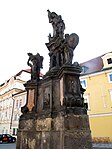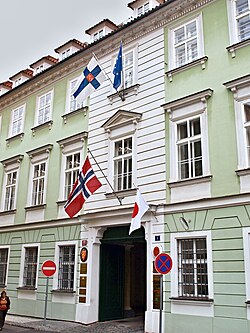Ministry of Education, Youth and Sports (Czech Republic)
1969 establishments in CzechoslovakiaChildren, young people and families ministriesCzech Republic politics stubsEducation ministriesEuropean government stubs ... and 3 more
Government ministries of the Czech RepublicMinistries established in 1969Sports ministries

The Ministry of Education, Youth and Sports of the Czech Republic (MEYS, Czech: Ministerstvo školství, mládeže a tělovýchovy České republiky; MŠMT ČR) is a government ministry that was established in 1969. Before the federalization of the Czechoslovak Socialist Republic, it was the Ministry of Education of Czechoslovakia. Its head office is in Prague 1.
Excerpt from the Wikipedia article Ministry of Education, Youth and Sports (Czech Republic) (License: CC BY-SA 3.0, Authors, Images).Ministry of Education, Youth and Sports (Czech Republic)
Karmelitská, Prague Lesser Town
Geographical coordinates (GPS) Address Nearby Places Show on map
Geographical coordinates (GPS)
| Latitude | Longitude |
|---|---|
| N 50.085383333333 ° | E 14.403611111111 ° |
Address
Karmelitská 529/7
118 00 Prague, Lesser Town
Prague, Czechia
Open on Google Maps











